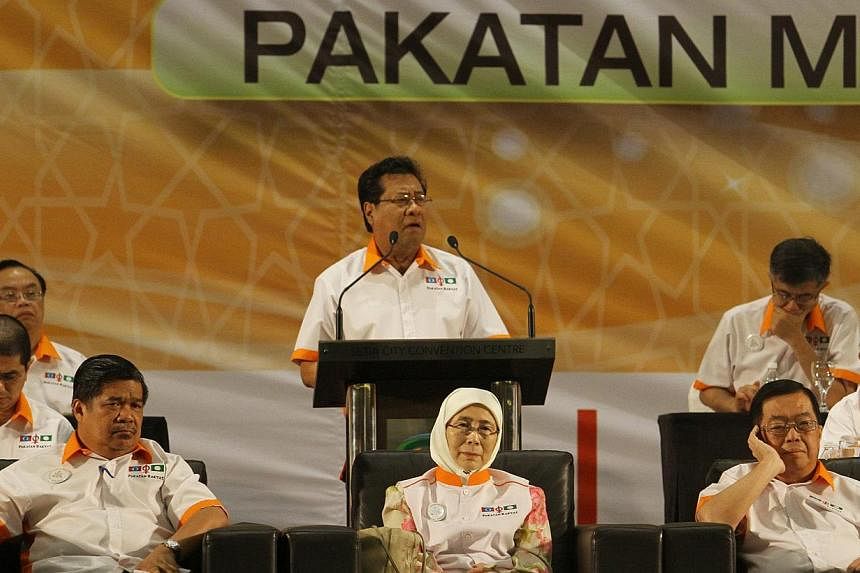THE infighting between leaders of Parti Keadilan Rakyat (PKR) and its ally Parti Islam SeMalaysia (PAS) has broken out into the open over whether Selangor's chief minister should be removed, in a dispute that has shaken their alliance.
Not only that. The raging debate within the top circles of the biggest Malaysian opposition parties has also pitted top PAS leaders against one another.
Both multi-racial PKR and Islamic party PAS are allies in the three-party Pakatan Rakyat (PR) alliance, the third partner being the Chinese-based Democratic Action Party (DAP).
How the infighting is resolved is important for Malaysia, because poor handling of the matter could cause the PR alliance to split, thus weakening the united opposition front that has so frightened ruling coalition Barisan Nasional (BN) since the 2008 General Election.
PKR, led by its de-facto chief Anwar Ibrahim, has decided to remove one of its leaders, Tan Sri Abdul Khalid Ibrahim, from the post of Menteri Besar in the state controlled by PR, Selangor, which is Malaysia's richest state.
The reason given was that Mr Khalid, who is into his second term as chief minister of Selangor, has been ineffectual in handling a variety of issues that has caused the PR to lose support among voters.
Once a key loyalist of Datuk Seri Anwar, Mr Khalid is today being blamed for the continuing woes of poor water supply to districts in Selangor, Kuala Lumpur and Putrajaya.
He is also being blamed for the failure to force the state's Islamic authorities to return Malay language copies of the Bible seized from a Christian organisation.
The PR alliance is also blaming Mr Khalid for not stopping a highway project called Kidex, which is opposed by some residents as it will run through their neighbourhoods.
But PKR cannot remove him on its own because the state government is formed by the PR alliance.
The party, whose president is Mr Anwar's wife Wan Azizah Wan Ismail, thus had to obtain the agreement of PAS and DAP.
At a PR leadership council meeting on July 23, some of the top leaders of the alliance partners appeared to have come to an agreement to oust Mr Khalid.
PAS was represented at the meeting by six of its top leaders, led by deputy president Muhammad Sabu.
But on Saturday, PAS president Abdul Hadi Awang - who did not attend the meeting - said there was no such agreement, and that Mr Khalid should stay as chief minister.
Datuk Seri Abdul Hadi said: "If he is involved in a scandal, breach of trust, misappropriation of government funds, then we can change. But if it is because of other reasons, it is not done by changing the Menteri Besar. Let him complete his term."
PKR secretary-general Saifuddin Nasution quickly issued a statement saying PAS could not now back out from the agreement made at the leadership council.
"This process is the highest decision-making mechanism in Pakatan Rakyat that has been respected ever since Pakatan Rakyat was founded.
"Every party is represented by the top leadership that is given the mandate to convey the decision of its respective party in Pakatan Rakyat," Datuk Saifuddin said.
Mr Muhammad, the No.2 PAS guy, agreed with Mr Saifuddin, saying what Mr Abdul Hadi had said was merely his personal opinion.
Mr Muhammad now is facing flak from senior PAS leaders for going against the party president openly. This is a big no-no in PAS, of which members have pledged loyalty to their top leaders.
And then comes the retort from some other PAS leaders who also said that Mr Khalid should remain in his post.
Among them are deputy chief of the powerful PAS Ulama (clerics) wing Ahmad Yakob and PAS commissioner for Selangor Iskandar Abdul Samad.
PAS spiritual leader Nik Aziz Nik Mat added his voice to those supporting Mr Khalid, saying on Saturday: "Just like many others in this country, I wonder what was the mistake and the error committed by Tan Sri Khalid for him to be dropped from the menetri besar post?"
It sounds incredible, but the disagreement, it seems, is over what was meant by a common Malay active verb, "menerima", from the verb "terima" which means "accept" or "receive".
PAS had, just hours after the July 23 meeting, put up on Facebook a statement saying it has "menerima" the plan to oust Mr Khalid.
PKR's Mr Saifuddin is saying PAS has "accepted" at the meeting the plan to oust Mr Khalid.
PAS says, however, that it has only "received", or heard, the plan, and needs more time to discuss it with the big bosses.
And now, PAS president Abdul Hadi has made his decision: Mr Khalid stays.
The situation is made worse for PKR by Mr Khalid saying that he will not resign.
There is another recourse for PKR if in the end the leadership council decision fails to hold. It could bring a vote of no-confidence against Mr Khalid in the Selangor legislature.
But here, the game gets more complicated.
The Selangor state assembly has 56 seats. To oust Mr Khalid, PKR needs at least 29 lawmakers to say "Aye".
PKR has 14 seats. Since Mr Khalid's seat is one of them, it has only 13 votes.
Its staunch ally DAP has 15 seats and has said it agrees to oust Mr Khalid.
Thus the PKR and DAP votes will be 13 + 15 = 28.
PAS has 15 seats in the house. Although several PAS Selangor leaders might agree privately to remove Mr Khalid, the party is expected to vote as one.
And BN's Umno, which stands to gain by breaking up PR, has 12.
Thus, the lawmakers expected to vote Nay to Mr Khalid's removal should be 1 (his own vote) + 15 + 12 = 28.
And there you have it - a stalemate.
Worse, the longer this political impasse and open infighting play out, the more voter support PR could lose as voters will likely perceive its politicians to be more keen on their own power plays than on running the state well.
Many opposition supporters are already pointing to Kedah state as a salutary case. PAS won Kedah in 2008 but lost it last year in a by-election due to open fights between the late menteri besar and top party leaders.


